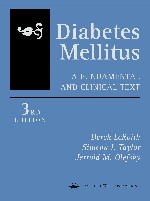Pt. I Insulin Secretion 1
1 Insulin Secretion in Humans: Physiologic Regulation and
Alteration in Disease States 3
2 Kinetics of Insulin Secretion: Current Implications 12
3 Insulin Gene Regulation 20
4 Processing of the Insulin Molecule 27
5 The Role of Glucose Transport and Phosphorylation in Glucose-
Stimulated Insulin Secretion 42
6 GTP-Binding Proteins and Regulation of Pancreatic Islet
Function: Part I. Heterotrimeric Proteins, Insulin Gene
Expression, and Insulin Secretion 49
7 GTP-Binding Proteins in the Regulation of Pancreatic [beta]-
Cell Function: Part II. Putative Roles for Low-Molecular-Weight
Proteins 57
8 Insulinotropic Glucagon-Like Peptides 68
9 Electrophysiology of the Pancreatic [beta]-Cell 78
10 Detrimental Effects of Chronic Hyperglycemia on the
Pancreatic [beta]-Cell 103
11 Islet Amyloid and Its Potential Role in the Pathogenesis of
Type II Diabetes Mellitus 113
Pt. II Insulin Action 119
12 Physiologic Action of Insulin 121
13 Glucose Counter-regulatory Hormones: Physiology,
Pathophysiology and Relevance to Clinical Hypoglycemia 132
14 The Biochemistry of Insulin Action 139
15 The Insulin Receptor 148
16 The Role of IRS-1 During Insulin Signaling 154
17 Small GTPases and (Serine/Threonine) Protein Kinase Cascades
in Insulin Signal Transduction 160
18 Protein-Tyrosine Phosphatases and the Regulation of Insulin
Action 174
19 Protein Kinase C 187
20 A Role for Insulin-Mediated Regulation of Cyclic Guanosine
Monophosphate (cGMP)-Inhibited Phosphodiesterase in the
Antilipolytic Action of Insulin 197
21 Insulin Action on Glucose Transport 205
22 Regulation of Glycogen Synthesis 213
23 Hormone-Sensitive Lipase and the Control of Lipolysis in
Adipocytes 223
24 Insulin and Intracellular Ions 227
25 Gene Regulation 234
26 Insulin Degradation 242
Pt. III Definition/Classification 249
27 Definition and Classification of Diabetes Including Maturity-
Onset Diabetes of the Young 251
Pt. IV Type I Diabetes 261
28 Interaction of Some Biochemical and Physiologic Effects of
Insulin That May Play a Role in the Control of Blood Glucose
Concentration 263
29 Diabetes Ketoacidosis and the Hyperglycemic Hyperosmolar
Syndrome 276
30 Natural History of Autoimmunity in Type I Diabetes Mellitus
287
31 Humoral Autoimmunity 298
32 Autoantibodies and the Disease Process of Insulin-Dependent
Diabetes Mellitus 307
33 Roles of Cell-Mediated Immunity and Cytokines in the
Pathogenesis of Insulin-Dependent Diabetes Mellitus 314
34 Major Histocompatibility Locus and Other Genes That Determine
the Risk of Development of Insulin-Dependent Diabetes Mellitus
326
35 Association Between Insulin-Dependent Diabetes Mellitus and
Other Autoimmune Diseases 333
36 Role of Viruses in the Pathogenesis of Insulin-Dependent
Diabetes Mellitus 339
37 Animal Models of Autoimmune Diabetes Mellitus 349
38 Transgenic and Gene Targeting Strategies in Insulin-Dependent
Diabetes 361
Pt. V Type I Diabetes: Therapeutics 371
39 The Treatment of Diabetes to Prevent and Delay Long-Term
Complications: The Diabetes Control and Complications Trial 373
40 Translation of the Diabetes Control and Complications Trial
378
41 Diet Therapy in Type I Diabetes 386
42 Exercise for the Patient with Insulin-Dependent Diabetes
Mellitus 395
43 Immune Intervention 402
44 Islet Cell Transplantation 408
45 Pancreas Transplantation 416
46 Gene Therapy for Metabolic Disease 432
47 Engineering the Pancreatic [beta]-cell 438
48 Principles and Fundamentals of Glucose Monitoring 443
Pt. VI Type II Diabetes 453
49 Epidemiology of Non-Insulin-Dependent Diabetes 455
50 Metabolic Abnormalities in the Development of Non-Insulin-
Dependent Diabetes Mellitus 459
51 Impaired Glucose Tolerance: Risk Factor or Diagnostic
Category 467
52 Obesity in Non-Insulin-Dependent Diabetes Mellitus 475
53 Effects of Aging on Glucose Homeostasis 484


